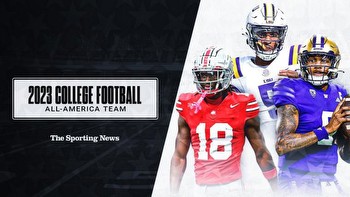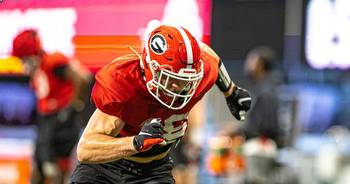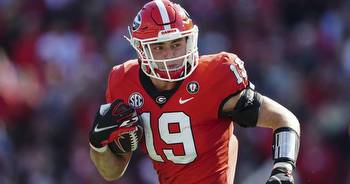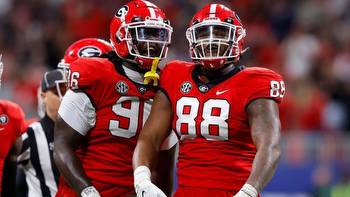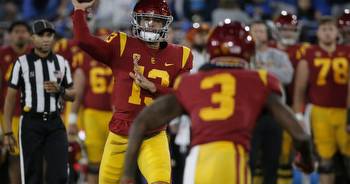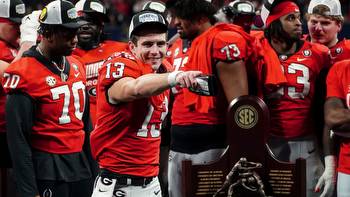Brock Bowers for Heisman? Probably not, but he just might be the best tight end college football's ever seen
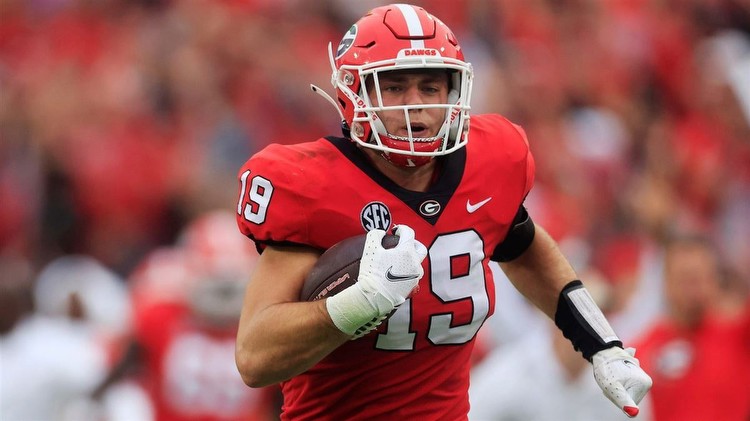
Kirby Smart doesn't like to wade into the Heisman debate. He said as much Saturday after a 27-20 win at Auburn. But Smart made an exception for tight end Brock Bowers after the All-American's game-changing eight-catch, 157-yard, one-touchdown performance.
"Who could argue there’s a better football player anywhere in the country – just football player?" Smart said. "The guy has the greatest toughness and grit that I've been around."
That debate, which puts Bowers in the discussion of those like USC quarterback Caleb Williams and Missouri wide receiver Luther Burden, will be settled as the season goes along; Caesars currently gives Bowers +6000 odds for the award. But you can already safely say Bowers is peerless in the College Football Playoff era among those who play his position. That might seem shortsighted, given we’re only three years removed from an all-time tight end season by Kyle Pitts. Yet, Bowers is in a different category than anyone in recent memory when it comes to career-spanning tight end excellence.
PFF began tracking college football stats in 2014, providing a decade-long measure of production that spans the CFB Playoff era. Look at how Bowers ranks overall among Power Five tight ends in these career-spanning categories:
- Receiving grade: No. 1 (94.3)
- Receiving yards: No. 1 (2,245 yards)
- Receiving touchdowns: No. 1 (23 TDs)
- Forced missed tackles: No. 1 (39)
- Catches of 15-plus yards: No. 3 (54)
Bowers isn’t halfway through his junior season and yet the former No. 59 overall player in the country is basically incomparable when you consider his contemporaries.
To expand the scope of potential comparisons for Bowers, it makes sense to examine winners of the John Mackey Award. Established in 2000 and awarded annually to college football's top tight end in college football, the Mackey Award has been given to 23 different players — including Bowers a year ago.
Among those 23 winners are historic tight end seasons. Chase Coffman dominated at Missouri in 2009 with 90 catches for 970 yards. Pitts made everybody look silly in 2020, averaging more than 100 yards per game, and Trey McBride rang up 1,121 yards on 90 catches last season for Colorado State. But for context of Bowers' consistent greatness, pretty much from the moment he arrived as a true freshman, here's how his career averages in terms of yards per game and touchdowns per game match up against the single-season production of the other 22 Mackey winners:
- Yards per game: No. 6 (63.9 yards)
- Touchdowns per game: No. 4 (.65)
Again, those are Bowers' career production averages stacked up against players who were considered the best at their position in a given season.
Now, let's look at how Bowers' career totals compare to every other Mackey winner:
- Receiving yards: No. 2 (2,237 yards)
- Receiving touchdowns: No. 2 (23 TDs)
Only Coffman ranks higher than Bowers in those categories, and it took him 50 games to finish with 2,659 yards and 30 touchdowns. Bowers is 35 games into his Bulldogs tenure.
There's never been a two-time Mackey Award winner. Even with more than half a season remaining on the college football calendar, Bowers seems like a lock to become the first. That means it's fair to pull the lens even farther out and ask a bold question:
Is Bowers the best tight end in college football history?
The production is there. He's 655 yards away from breaking BYU tight end Dennis Pitta's all-time FBS career tight end receiving record of 2,901 yards. Bowers would also need 10 receiving touchdowns to tie former Louisville tight end Ibn Green's career TE touchdown record of 33.
How does Bowers stack up against college football legends such as Oklahoma's Keith Jackson or Pittsburgh's Mike Dikta? That's nearly impossible to say.
Bowers was 15 years away from being born when Jackson played his final season at Oklahoma in 1987. And, frankly, Bowers is playing a different sport compared to Ditka in the late 50s and early 60s.
Bowers often plays out of the slot. He's only blocked on 50.3% of his career snaps, according to PFF. Ditka and Jackson were used far more often in that capacity. Bowers is practically a part-time receiver. Ditka played both tight end and defensive end while Jackson blocked in a wishbone offense that threw the ball only 99 times his senior year.
That's what makes all-time comparisons so fraught. Comparing eras is dangerous. Really, the only way to approach a conversation of that sort is to consider a player's dominance against his peers. In that way, Bowers' all-time greatness is already assured. Nobody is more successful as a modern college tight end. He is the Dikta or Jackson of his era.
Bowers is a two-time national champion and All-American, and he could end up with multiple career tight end records. His is an all-time, nearly unimpeachable resume.

